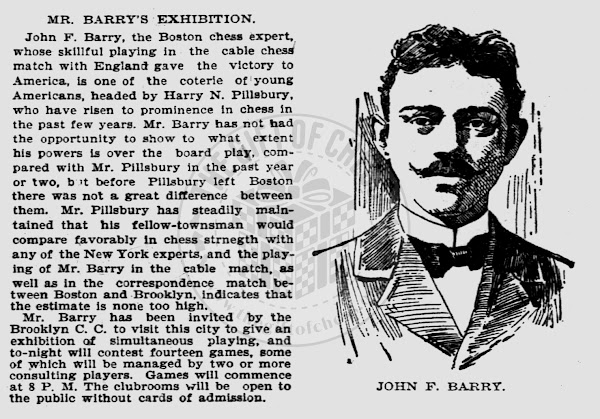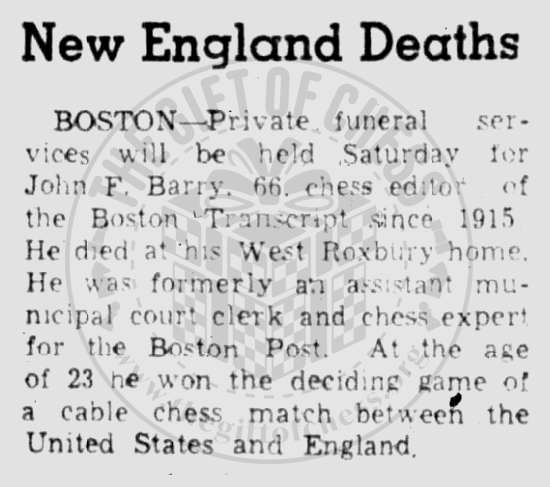March 06 1898
The Butte Miner, Butte, Montana, Sunday, March 06, 1898
Chess Contest by Cable
The interesting of all who are skilled in that most difficult and fascinating of games, class, is beginning to center in the great Cable Chess match, which is to be played early in March, between all England and the United States. The fact that this will be a strictly Yankee-British contest, since only native-born citizens of the respective countries are allowed to compete, adds zest to the struggle for national chess supremacy. So far the honors have been quite evenly divided between the two nations. In 1896 America won the trophy, but had it wrested from her by the British in 1897. This year should the British win again, the trophy will be theirs to keep, hence the best players of both nations are bound to do their best. The trophy for which the rival teams are contending is a solid silver Chess Cup, valued at $1,000. It is 30 inches high, 24 inches long, 15 inches wide, and weighs with its base of polished ebony 40 pounds. The design represents America, with her shield and liberty cap and eagle, on one side of the base, and on the other Britannia, with trident, shield and lion. Above these figures all the chessmen appear, the rook being the standard and the bishop the apex of the bowl. Around the bowl cluster the pawns, and the queen and king and knights are used as ornaments in relief. This splendid trophy was presented by Sir George Newnes, President of the British Chess club.
The ten players who have been chosen to do battle for England this year are all exceptionally strong players; and in them the Americans will meet foemen worthy of their best steel. Their names are: J. H. Blackburne, Amos Burn, H. E. Atkins, G. E. H. Belingham, E. M. Jackson, C. D. Lowcock, D. Y. Mills, H. Jacobs, H. Caro and H. W. Trenchard. Three of these men, Burn, Caro and Trenchard, had no part in last year's match. Amos Burn has just won first prize in the amateur tournament in Wales, conquering Bellingham the former winner. He is now in splendid working form; and may have the opportunity of averaging himself on Showalter, who defeated him in 1896. H. Caro is the young expert, who at Berlin last summer made his international debut; and, although winning no prizes, proved himself a remarkably able chess player, H. W. Trenchard played in the original cable match between the British and Manhattan Chess clubs several years ago; but has had no opportunity since, until the coming match, to show what he can do. The six players who have been selected to defend the Newnes trophy are all men with brilliant records. Not one of them so far has been defeated, except Lowcock. Blackburne conquered Pillsbury, with 1 points to his credit. Atkins, the amateur champion of England, defeated Burrille and drew with Delmar. Bellingham made his first international fight last year and drew with ex-United States Champion Hodges. E. M. Jackson has a clean score to his credit, conquering Baird of Manhattan and Helms of Brooklyn. Lowcock was defeated by Showalter and tied with Hymes. Mills, the Scotch champion, drew with Hodges and with Hymes. H. Jacobs won a brilliant victory over McCutcheon last year, and his selection adds materially to the strength of the English team.
Such, briefly are the records of the men against whom the Americans are to contend; and, without doubt, it will prove to be the strongest team ever pitted against America by Great Britain.
Of the American chess players, H. N. Pillsbury is the most famous, Mr. Pillsbury is a young man, only about twenty-six years old, and yet he is one of the ablest and best known chess players in the world today. He received his chess education in the Deschapelles and Boston clubs, and early showed a remarkable mastery of the difficulties of the game. His first great achievement was the winning of two games, at odds of pawn and move, from the celebrated Steinitz. This was in 1892, and the feat gave publicity to his name. Since this date his rise to fame has been phenomenal. He has conquered some of the best chess players of this country and of Europe, notably at the Chess congress held at Hastings, England, where he defeated, with apparent ease, such veteran players as Steinitz, Lasker and Tarrasch. Last year he won the championship of the United States from Showalter by a score of 10 to 8 and three draws.
Jackson W. Showalter is another of America's notable chess players. He first came into prominence as a chess player something like ten years ago. He is a strong strategist, and has met successfully some of the world's best players.
A. B. Hodges is a Southerner by birth, and an exceptionally strong player. He has held the championship of the New York State Association, and is considered one of the most brilliant players in America.
Eugene Delmar is a veteran at the board. For at least twenty years he has been looked upon as one of the great players of the country; but he is not in any sense a back number, as his recent victories testify.
John F. Barry has won first prize in several club tournaments and matches against the finest players in Boston, and is considered one of the ablest chess experts of that intellectual city. He is not yet thirty years old; but already takes rank in the higher chess circles. Among the other famous American chess players, who have won an international reputation, may be mentioned the names of F. M. Teed, C. F. Burrille, Hymes, Helms and McCutcheon.
The unique feature of this celebrated chess match is the distance which separates the opponents. There will be something like 3,383 miles, mostly of salt water, between the opposing players; and yet the move of each player will be known to his adversary in a few seconds. This wonder is accomplished through the agency of the submarine cable.
The method of playing distant-matches is interesting. Promptly at 9:30 o'clock, a.m., New York time, on the day selected for the opening of the match, the players of each team will take their places at tables numbered from 1 to 10. One of two slips of paper, numbered 1 and 2, will now be drawn. If the number drawn is odd, the odd-numbered tables of the British side have the first move; if even, then the even-numbered tables of the same side move first. The result of the drawing is at once cabled to the other side and the names of the players in the order at which they have been seated. Time will be called at 10 o'clock, a.m. The instant a move is made it is sent flying across the ocean; and in less than fifteen seconds the opposing player has knowledge of it, and can move accordingly. Every player must make at least twenty moves an hour. He must divide up the hour to suit himself, that is, he can spend ten seconds on one move and ten minutes on another, but the sum-total of moves during the hour must equal twenty.
Thus will the great Cable Chess match be played to a finish, with the Britishers in London, the Americans in Brooklyn and the stormy Atlantic rolling between. Truly the nineteenth century is beginning to annihilate distance.





































